One of the World's Most Anticipated Luxury Hotels Is Disappointing
Plus, destinations you'll never go again, Airbnb under fire in Spain, Spanish Steps sadness, and Booking.com takes a hit.
It seemed like the perfect idea—a one-night staycation at one of the most hotly anticipated hotels in the world as a little break during a two-week family trip.
I pulled up the website for the Rosewood Amsterdam and started to look at availability for the coming week. While most nights had entry-level rooms starting at 1000+ euros, on Tuesday night it was in the 800s. Pricey, but justifiable in the context of familial reprieve and for the purposes of an unbiased review for the newsletter, like I’ve done for Estelle Manor, Vestige son Vell, and others.
After all, the Rosewood Amsterdam took ten years to complete and is housed in one of the few truly monumental buildings on the historic canals. And it’s gotten a fair bit of press. The Times recently declared Amsterdam’s “hotel scene will soon be crowned by the arrival of Rosewood Amsterdam in the former Palace of Justice.” Travel + Leisure gushed over every corner of the place, gobbling up everything its designer—Piet Boon—had to say about his design. Conde Nast Traveler’s write-up was relatively circumspect as these things go. I read it before going, and then read it again while writing this and noticed that for the most part, it’s descriptive rather than opinionated —often a sign the writer wasn’t too enamored. The New York Times had a quick little write-up that repeated Boon’s declarations about creating gezelligheid (Dutch coziness). And Vogue put it on its list of most anticipated hotels.
Something, perhaps divine providence, prevented me from finalizing the booking.
A few days ago, with a Rosewood Hotels—loving sister in town, we decided to pop in to grab a drink. My memory of late has become less than stellar, and suddenly one bubbled to the surface. I’d been told by a successful and usually kind designer that the project felt like one giant missed opportunity.
It bubbled to the surface because after walking around the rabbit-warren-like maze of public spaces in search of one we’d want to grab a drink in, all of us, visibly uncomfortable, wanted to leave. While the goal may have been warmth, the hotel was giving anything but.
“All the natural elegance of an administrative building,” one person in my group said.
I went again this afternoon to make sure my initial reaction was a fair one. And I should note that I did not stay overnight at the hotel or eat there. Walking around its public spaces (and nosily poking my head into private ones that were left open), I found myself profoundly disappointed. There is nothing warm or cozy about it. There are board games in the lobby, but, um, they’re trapped in a cold glass box. The art, which writers have made such a fuss out of because of the high number, is so weirdly placed I can’t find a rhyme or reason to it. And the bar, which I hoped to give a shot, is closed on Sundays and Mondays.
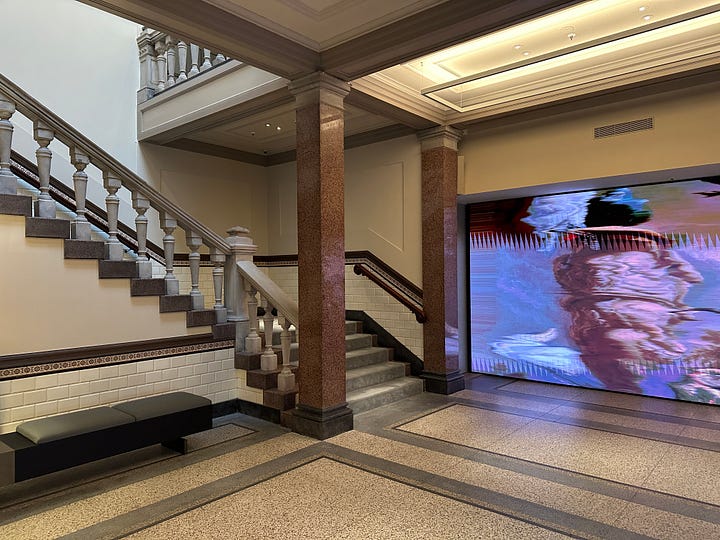
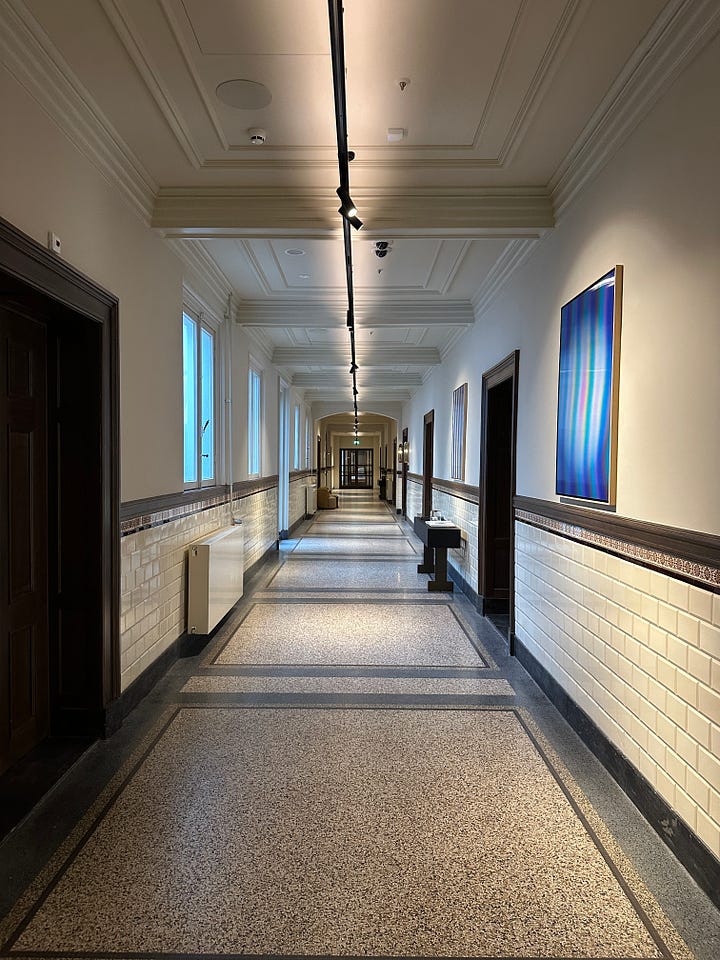
The Grand Library, a former courtroom-turned-lounge is one of the most perplexing rooms I’ve been in lately, as I would never have guessed its function before learning its name. It’s a feat that starts with the electric stovetop set into the marble table right when you walk in and continues with the lack of books. The courtyards, designed by the High Line’s Piet Oudolf, also left me underwhelmed but the hotel did open early and gardens should be judged after a fair amount of time has passed. You could see into the suites (called houses by the hotel) from across a small courtyard and they were done in what I’d call globalist luxury–sort of what you’d expect in a modern London townhouse.
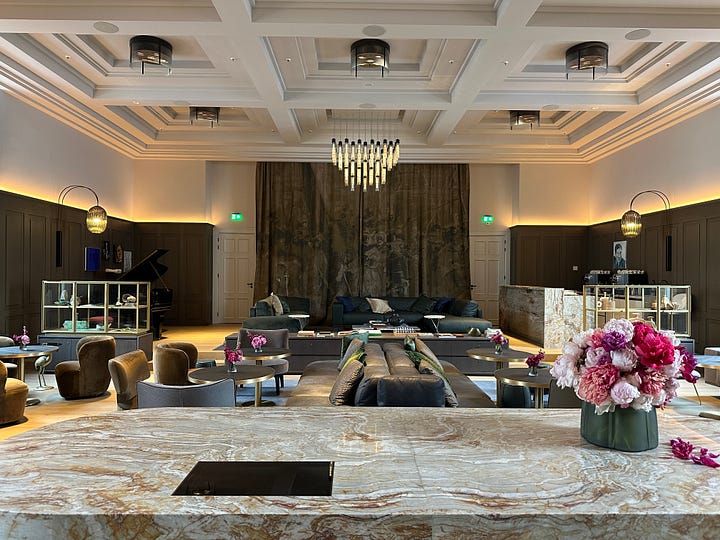
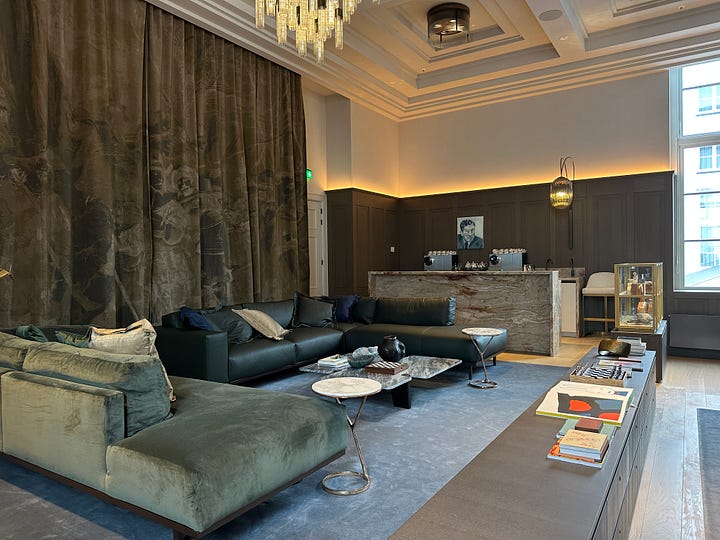
But walking through I found not a single moment, a single space, that had a wow factor.
I will be happy to eat my words should the hotel be a smashing success, but I think the failure to be cozy and contemporary in a grand historic building is even worse when the market calls for something else. People expected the Rosewood to fill a gap at the high end of the market here, as the only well-known competition is the Waldorf which has been around forever. (Mandarin Oriental is taking over the other competition, the Conservatorium.) So slim are the pickings for high-end that a charming boutique property like the Pulitzer has seen its rates creep ever upwards because demand was always there.
Adding insult to injury, the hotel is engaged in a bit of historical legerdemain, similar to Newport’s Vanderbilt Hotel. Just as the Vanderbilt wants everybody to think it was once a Vanderbilt mansion (how anybody could believe this just by looking at it boggles my mind, but every major news outlet has credulously printed it) when it was a YMCA the family built, the Rosewood Amsterdam touts itself as a former Palace of Justice from the 1660s. Except, it wasn’t the Palace of Justice until the 19th century. The building erected in the 1660s and designed by Daniël Stalpaert (who also worked on what is now the Royal Palace and the 's Lands Zeemagazijn) was an orphanage. And it looked nothing like the current building.
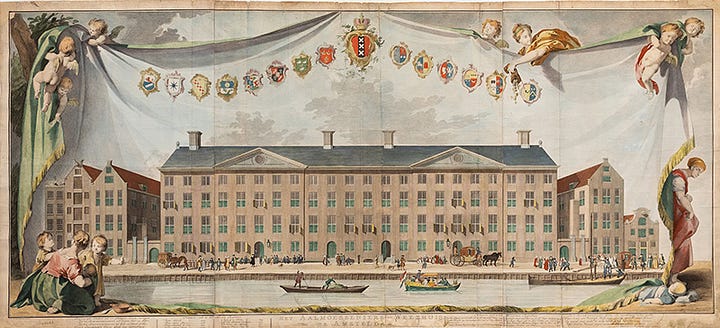

The current building was constructed in the 1820s, first by redoing the interior and then completely redoing the exterior. But the chance to give a historical pedigree that guests, particularly Americans, crave was too hard to pass up.
So if you find yourself in Amsterdam, or if you’re such a Rosewood fan (which I get. I think they’re one of the best-run luxury hotel groups) that you end up booking it, keep in mind what Piet Boon said about the project and see if you think he pulled it off:
"Stepping into Rosewood Amsterdam feels like discovering a hidden gem within the city’s heart—a place where Dutch heritage meets the warmth of modern luxury. We wanted every space to reflect Amsterdam’s soul: rich in history, effortlessly elegant, and alive with charm. Each detail invites guests to feel at home, immersed in a journey that flows from the timeless beauty of the 17th century to a fresh, contemporary Dutch design perspective.”
Meh.
DEPARTMENT OF GRIEVANCES
The video of tourists fleeing a collapsing roof in China surfaced something I try not to think too much about–we put a lot of trust in the safety regimes of other places. This is not to single out China given what happened this year at DCA or with the Florida condo buildings and so on. But nearly every week I read about some ferry collapsing because they let too many people on or some other mishap that comes from shoddy regulation or enforcement. And I try not to dwell on it too much because otherwise you’ll never leave the house.
Tony Wheeler, the co-founder of Lonely Planet, has published a blog post about the destinations he’ll never return to. It’s sort of a funny list, mainly because it’s an odd combination of political (the U.S., Russia, and Saudi are on there), cantankerous (Bali, for the traffic), and oddly specific (one of the Saudi reasons in addition to the politics is his experience with cheetahs being trafficked there from Somaliland). Lists like these often are, but it reminds me of a general feeling I have about moral relativism and hard nos when it comes to travel. While there are certain experiences or people I’m loathe to give my money directly to, I don’t view traveling to most places as tacit support for its government. Countries are full of people who don’t choose their leaders, and a life lived where you constantly worry about the final beneficiary of every dollar you spend sounds like a miserable one to me. For sure, there are times when it’s probably not the best look to go somewhere. But how do you expect places to change if they’re isolated?
I mentioned this in last week’s main story about Airbnb’s rollout of its new experiences and services, but a lot of that push reads to me as a response to how much pushback the company is getting throughout the world. For example, this week Spain ordered Airbnb to remove a whopping 60,000 listings nationwide from its side. And another ruling could be coming down that requires the takedown of a further 60,000. It also came out that the country is considering a staggering 21 percent VAT tax on short-term rentals! These are body blows considering Spain is the second most visited country in the world!
Now might be the time to look again at that Japan trip, as bookings to the country from other East Asian countries have reportedly dropped due to fears of an earthquake predicted by a Manga novel.
There are too many competitions and lists (honestly how many airline awards are there?!) but I do like when architecture ones surface things I haven’t kept an eye on. This year’s winners of the Prix Versailles for best new museum architecture have been released. Two of them are in the U.S.—the Cleveland Museum of Natural History and Joslyn Art Museum in Omaha. I’ll have to check them out soon. Also making the cut are the Grand Palais in Paris, France Saka Museum in Bali, Audeum in Seoul, Kristiansand in Norway, and Diriyah Art Futures in Riyadh.
After a decade of going at least once a year, I haven’t been back in Rome in a few years. Part of that was the crowds, part was that some of my friends based there had moved elsewhere. But it’s still an incredible city and richer in history than almost anywhere else. So I have mixed feelings about Rick Steves’s lamenting how Rome banned people sitting on the Spanish Steps. I get how miserable crowds have made it and that people leaving litter on it after sitting for lunch is terrible. But I think the sight/experience of police monitoring it and yelling at people almost equally unpleasant?
Group travel often involves some form of dealing with who pays and when and how much. And the Dutch and British system of taking a deposit at time of making a restaurant reservation and counting it toward the final bill is a really annoying one. It just adds another complication to an already fraught situation. I’d much rather it be one where that amount is returned, like a hotel does with your incidentals deposit, and then we get to sort it on our own.
Everything about this Wall Street Journal piece about pool chair wars at resorts makes me never want to go to a resort and I seriously question anybody who goes to a place where this happens and goes back.
TRAVEL INDUSTRY NEWS
Two popular beaches on the east coast will now require timed reservations
Boeing reaches settlement with Department of Justice over 737 Max crashes
The Balearic Islands will no longer be using influencers to promote tourism
United had its first Starlink wifi flight
Swiss government orders Booking.com to cut its commission fee
Southwest will no longer allow portable batteries to be stored in passenger bags


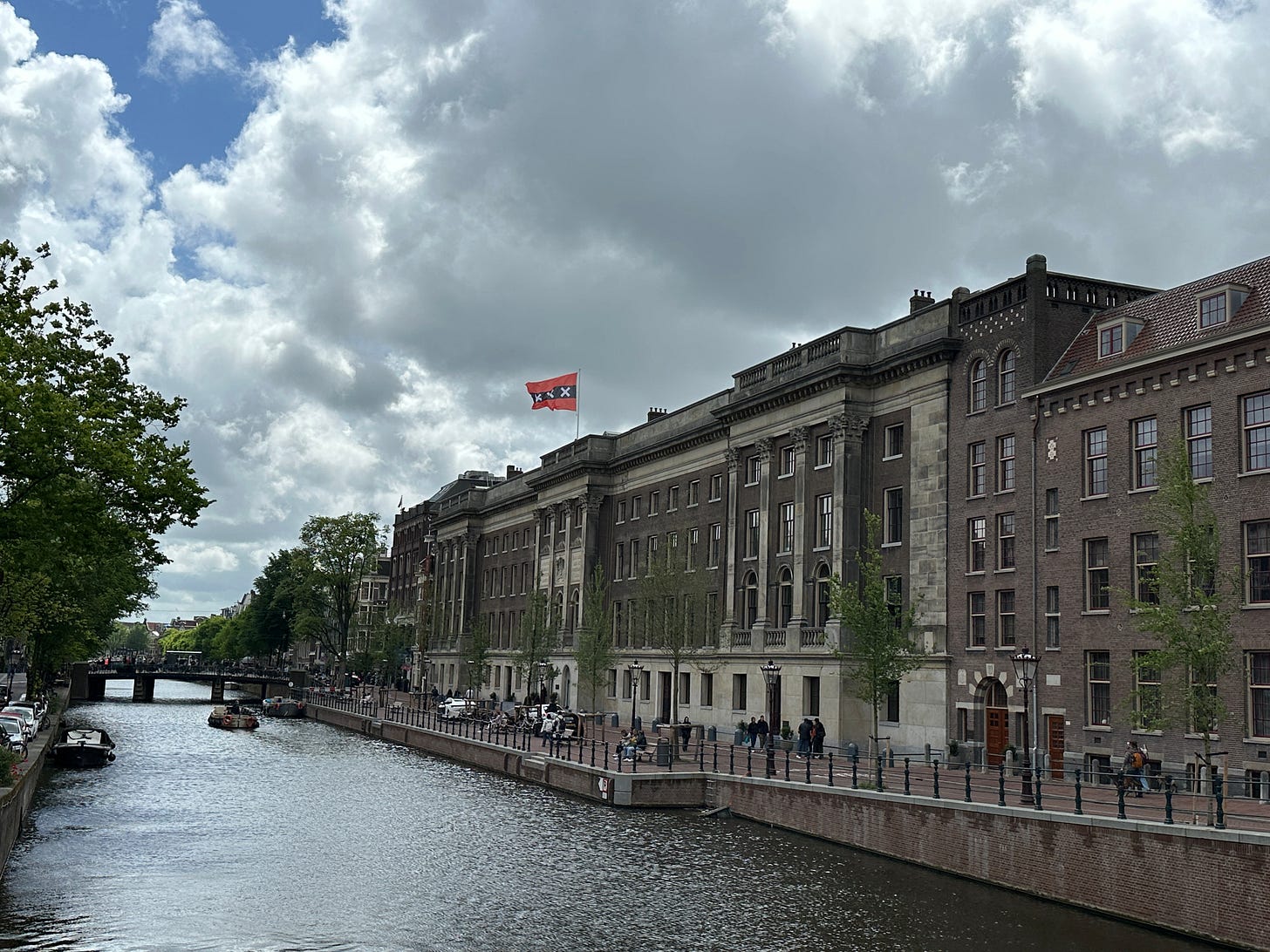
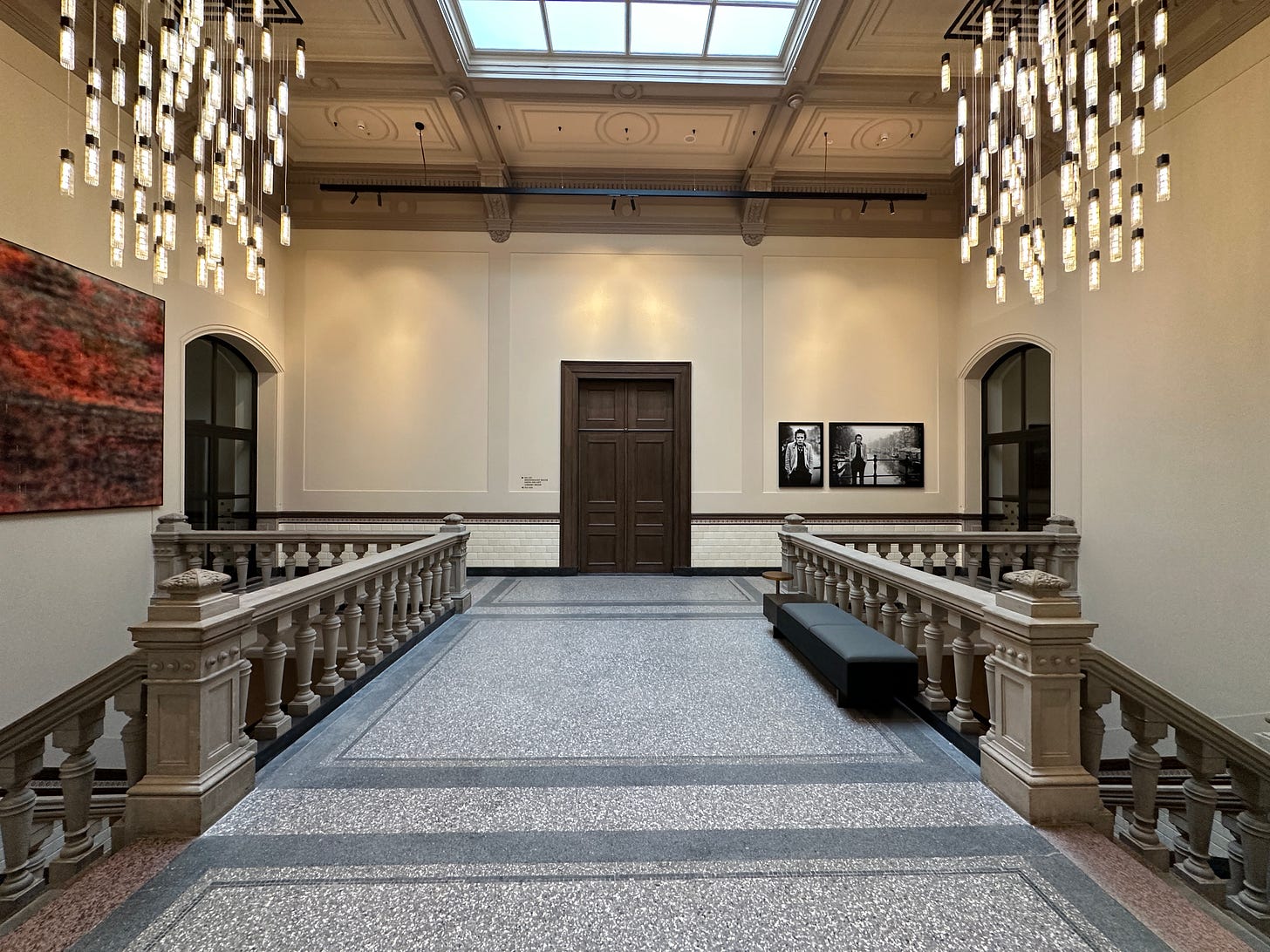
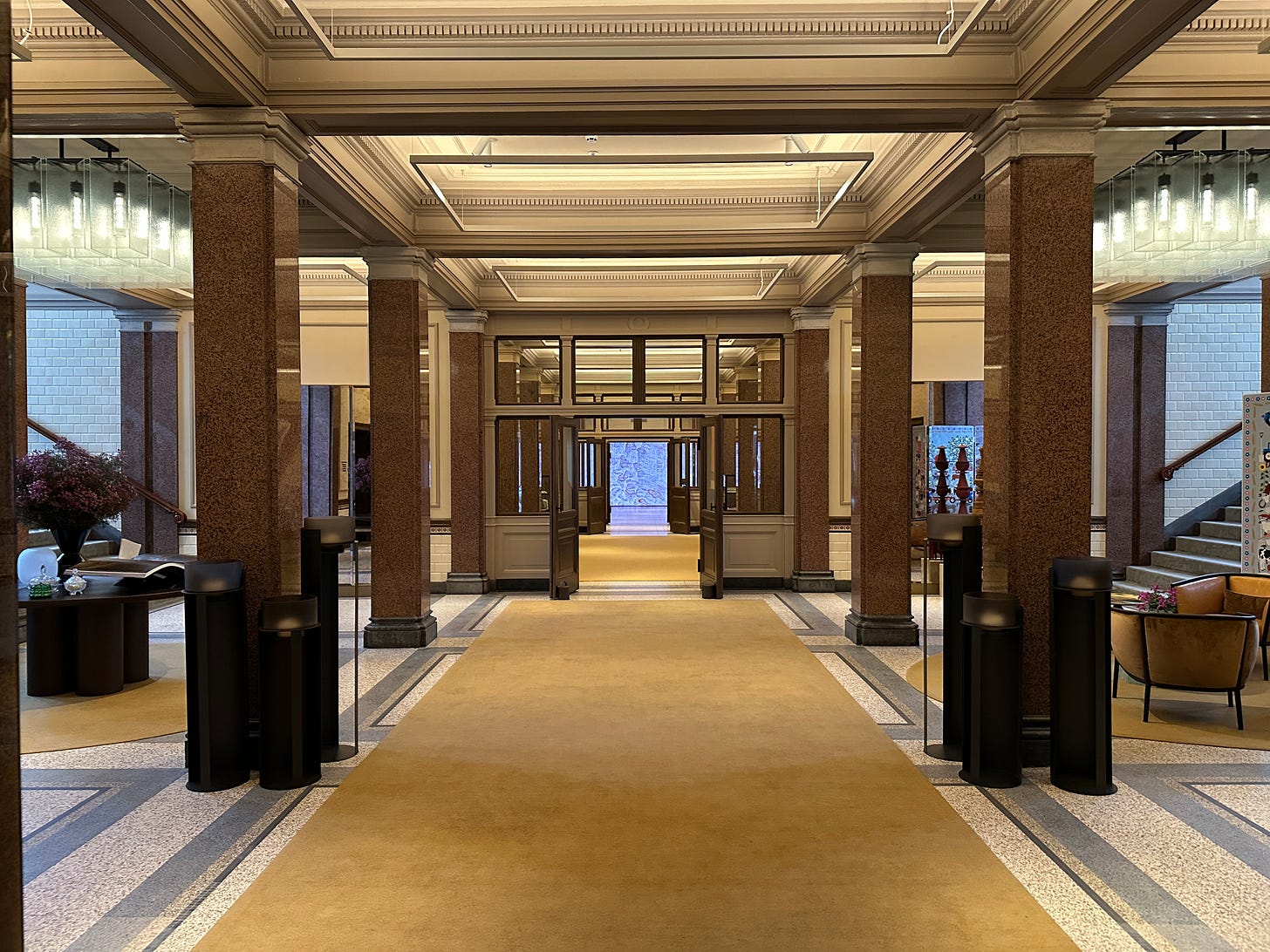
The Rosewood Amsterdam does look a bit sad. It's too bad they didn't go in the direction of Abbaye des Vaux de Cernay in France where Cordelia de Castellane created beautiful layered and cozy spaces throughout the old monastery. It's definitely worth visiting if you haven't yet.
What a disappointing experience at the Rosewood! It looks so unwelcoming.